spiritual questions and answers PART 12 By Prof. G. Venkataraman |
||
Since Heart2Heart started in 2003, readers have very often written to us seeking answers to many spiritual questions. We have answered them at times through appropriate articles in H2H. However, there are still many that have to be explained carefully and in detail. And in the recent past, a lot more queries have arrived on varied topics concerning spirituality and personal growth.
We have now meticulously compiled and categorised these questions, and Prof. G. Venkataraman has offered to answer all these queries in a structured and systematic way as a series on Radio Sai as well as in H2H. In this way, these answers now remain always on our website as a ready reckoner on spiritual doubts.This is a suitably adapted transcript of our radio series bearing the same name. To listen or download the talk from our website, please visit www.radiosai.org/qa
Loving Sai Ram and greetings from Prashanti Nilayam. Before I begin, I must mention, as I have done earlier, that I am not sure that the questions as presented to me are exactly as they were posed, or have been slightly edited to make them a bit clearer. Often, people ask questions that are somewhat imprecise because of the confusions they have. This is not to be sneered at, and I certainly would not complain. What I am trying to say is that while during an actual talk when questions are often asked, I can seek clarifications from the questioner, or ask someone else to help me and restate the question in a manner that I can understand, I cannot do so here. All I can do is try and handle the question as it is given to me, in the best possible manner.
With that introduction, let me consider the questions put up for this broadcast. Unlike earlier, I shall take one question at a time because the questions are so diverse. The first question is the following:
Question 1: Why did God Create Living Beings?
I believe Swami Himself has answered this question. In fact, I don’t know if anyone has answered this question before Swami did, and in case anyone has, I am almost certain that they could not have given such a beautiful answer as Swami has. Basically, Swami’s answer goes as follows.
God first created the Universe as a stage, and on this stage He put living beings so that by loving each other, they could transform love from an abstract concept to something that is meaningful and is manifest. |
The Manifestation of Pure Love
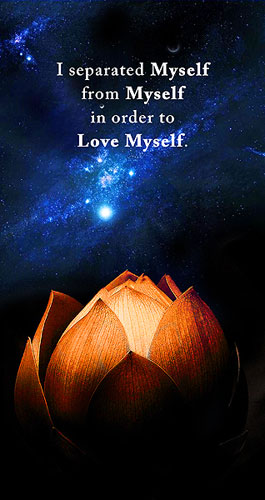 |
God is Love, Pure Love in fact. When there is no Creation, there is only God and that too in the formless aspect. Embedded in this is Love but it remains in abstraction. Let us say there is a rose plant. I am sure you will agree that it is when the rose flower actually blooms that one appreciates how wonderful that plant is, giving us as it does the pleasure that the rose offers not only via its beauty, but also its fragrance.
Swami says that in the same way, God created the Universe to serve as a platform for Love to manifest in a practical form. In other words, the Universe is like the rose plant that is yet to bloom, and that is my first point.
OK, so there is the Universe; what about the living beings? That really is what the question is all about. Consider the statement of Swami wherein He says: “I separated Myself from Myself in order to Love Myself.” What He means is that when He created living beings, He embedded love into each of them, so that through their various actions, these beings could show love to each other; this was one way of using the Universe as a stage in which God’s Love story is played out. There are in fact many examples of love in action in the living world.
Consider, for example the way a tigress fiercely protects her cubs; that is a manifestation of Divine Love playing out between the mother tiger and her cubs. Maybe neither the mother nor her children are aware of it but we are, are we not? Consider next a bird feeding its young ones; I am sure you have seen, as I have, photos of such a scene.
Just consider the great distance that the older bird sometimes flies to collect all the food, and, coming back to the nest, feeds the young ones. That again is what the manifestation of love means in practice. And by the way, when these young birds grow up, are they going to care for their mom and pop? By no means; so in this case, the parent is actually sacrificing, although it might not be aware of it. Please remember that Love without sacrifice is meaningless and that sacrifice without Love is impossible!
Moving on, there are amazing photos of animals of one species giving milk to the baby of some other species; not common I agree, but I am sure you have seen such pictures, as I have. And then, there is the way dogs love their masters. So where non-human living species are concerned, I think I have cited enough examples of how Love plays out. To recap what I have said thus far, God first created the Universe as a stage, and on this stage He put living beings so that by loving each other, they could transform love from an abstract concept to something that is meaningful and is manifest.
Let me move on and now consider humans, where things change on a huge scale. Why? That is because humans are not only conscious beings but have reasoning power, which allows them, among other things, to look beyond the world of mere sense perception. What I mean is that humans can look within, recognise the presence of Conscience, understand the difference between good and bad, understand that Creation came from a Creator, and so on. In other words, humans are way above other living species. Humans not only have enormous reasoning and creative powers, but, more than any other species, are able to exhibit to an amazing extent, feelings of compassion and love. Moreover, they are able to recognise that such virtues spring from the Soul or the Atma within.
As Swami sometimes says, there was no one to know who I was, and so I created humans and blessed them with a superior sense of awareness enabling them to recognize that behind Creation there is a Creator who is always full of Pure Love.
Does it all stop merely with humans finding out that God exists? No, one has to go much further. In what way? In two ways. Firstly, one must see God everywhere, in everything, and all the time. Next, one must react to this Omnipresence in the manner God expects us to. And what does God expect of us? To love all beings and to serve all beings, at least to the extent we can. In short, when we love each other as we are expected to, we would be making Swami’s statement about He loving Himself via various beings come true. I hope all that is clear!
The next question in my bag for today is:
Question 2: During Pralaya (total annihilation), if everything gets destroyed, where would God be? Would He also be destroyed?
Frankly, I am a bit surprised by this question. Anyway, let me try and answer it since it has been posed to us. The first and the most important thing we must remember is that God is Eternal, which means that He always is; He has no beginning or end. So, there is no question of God ceasing to be, even when the Universe is dissolved. The word Pralaya refers to the dissolution of the Universe; from what I have just said, it should be clear that God continues to exist even after Pralaya or dissolution of the Universe.
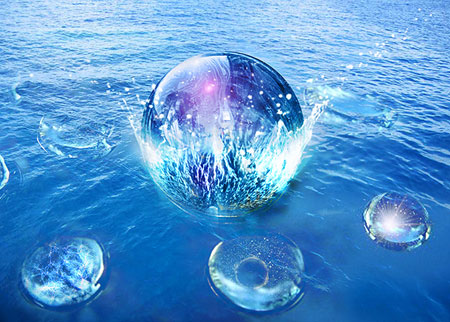 |
|
In the Gita, Krishna makes all this very clear to Arjuna. He says that He always exists in a Formless Aspect. Vedanta refers to this aspect as Niraakara Brahman or God without Form. God in this aspect is Pure Consciousness, which is totally non-material. Therefore, God as Pure Consciousness does not require any material Universe for Him to exist. However, while existing in this aspect, God can, if He so chooses, create a Universe - and He does do this at times. Once He creates a Universe, He then fills it with both inanimate and animate beings. At that time, God has ‘two Presences’ - one as Niraakara Brahman, and another as God who is immanent in the entities that are present in the Universe. Of course, when we see the Sun, or the ocean, or even a peacock, we see only the entities as such. However, as I just pointed out, God is immanent in these entities; that is why the Sun is so full of energy; that is why the ocean is so powerful and that is why the peacock is so beautiful.
Once many years ago, when Swami was with students in Trayee Brindavan, someone described how Swami appeared in America [or was it Canada?] and saved a person there from a real difficult problem. We all listened with our jaws dropping. After this exciting narration was over, one of those present asked, “Swami, how could You be present in two places at the same time, that is to say here in Bangalore and there in America?"
Swami gave a wry smile and replied, “You people seem to have a dim opinion about God’s power. Somebody speaks in Washington, you are able to see that person in your drawing room. If man can do these things, is it not possible for God who is Infinitely Powerful to be in two places at the same time?”
To get back to the question and complete the answer, God always exists as the Formless God, or Niraakara Brahman, whether there is a Universe or not. So, even after Pralaya, God would continue to exist as Niraakara Brahman; there is no change in that status. However, one aspect does change when the Universe is created. While the Universe exists, God hides Himself in the various entities; this is what I refer to as the immanence of God in things created.
When the Universe dissolves and the various entities disappear, God withdraws Himself into the Formless Aspect, which, as I just told you, always exists. In other words, while the Universe exists, God has two Presences simultaneously. When God dissolves the Universe, God shuts down one of these presences while maintaining the other aspect, the Formless aspect that is. I hope you follow what I mean.
A change of topic again, and the next question is all about transformation. It has many parts that are as follows:
Question 3:
1) Are there any stages in the process of transformation?
2) How do we know we are making progress and is there any method of measuring this progress?
3) How does one know that one has transformed?
Let us start with the question whether there are any stages in the process of transformation. I would like to begin my answer by discussing first what I believe is the real meaning of the word spiritual transformation.
Transformation means giving up the feeling ‘I am the body’, and acquiring instead the feeling ‘I am the Atma’. |
There are many ways of doing this, all equivalent of course. One way would be to say transformation is a process that makes us pure. Another way would be to say transformation is a process of overcoming our Spiritual ignorance, and so on. I personally think that perhaps the most useful definition would be to state that transformation is a process whereby we give up body-consciousness, or Dehaabhimaanam as Swami refers to it, and acquire in its place, Atmaabhimaanam, or the awareness that far from being the body or the ego-self, we are in fact the Atma. In short, transformation means giving up the feeling ‘I am the body’, and acquiring instead the feeling ‘I am the Atma’. I hope you can remember that.
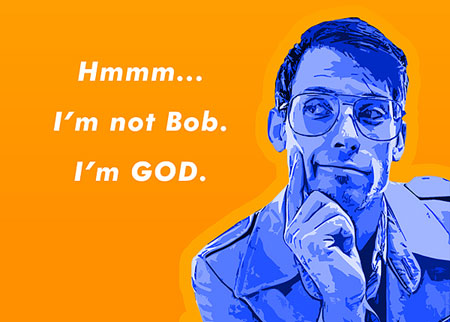 |
|
Swami has explained all this many times and I too have spoken about it in some of my talks. However, for the sake of completeness, I guess I have to make some comments here. It all goes back to the famous question: “WHO AM I?”
I am sure you have heard Swami raise this question many times. With regard to this question, which is all about one’s true identity, each of us has two options. Either we identify our personality with what is variously called the ego-self or the lower-self, or else we identify with the Atma. The Mind is the agency that makes the choice and seals our fate.
Let me consider for a moment, the situation when a person thinks he is the body. This identification results when we become attached too much to the body. Let us say there is a Mr. Smith. As Swami has told us many times, Mr. Smith is the name that comes from the family into which the person is born; it is given by the parents. In short, it is something connected with the body.
Yes, this name is important in the context of worldly affairs, and that is the reason why most people identify themselves with the body. This happens because the Mind is excessively focussed on the external world. However, where God is concerned, He is not going to be bothered whether X is Smith or John or whatever. He is only concerned about the virtuous qualities that X has. In other words, where Spirituality is concerned, what really matters is to what extent one is able to identify oneself with the Atma, as compared to the body. To put it differently, the Mind must look more Inside than becoming absorbed with the external world.
Now you might wonder: “What on earth does it mean to identify oneself with the Atma? This is not only difficult, but almost seems like a meaningless proposition.” Is it really meaningless? Let us examine by going back to Mr. Smith and imagine that someone insults him. Now if Smith is like most of us, he would get hot under the collar, the moment the insults are hurled. There is nothing unusual about this, and in fact this is the reaction one would normally expect. All this is true no doubt, but we must, at the same time, realise that all this happens entirely on account of body-consciousness or ego.
 |
Let us now suppose that Mr. Smith takes a different approach and says, “So and so is trying to insult me; but he is not insulting me; rather, he is insulting the body that I wear. Since I am NOT the body, I really need not pay any attention to what is being said.”
Now, I know most of you would shake your heads and say, “This is ridiculous! Who would ever shrug off an insult in that unrealistic manner? It is meaningless and irrelevant,” and so on. Well, just because we are so used to doing something that does not make it right. For example, in India, hardly any car driver ever observes road rules; in fact I believe most drivers do not even know that road rules exist! I am not making this up for I have seen even the police here parking vehicles in full violation of all parking rules, which by the way, do exist. The point I am making is that just because we all tend to do something, it does not necessarily mean that what we are doing is correct.
Putting all this together, whether we like it or not, just because most people behave that way, having body-consciousness, or Dehabhimaanam, or attachment to the ego-self, it is not the right thing to do. Instead, we should progressively shed this body-consciousness and move towards Atmaabhimaanam. Many a time, people tell me, “Come on, be realistic; this is simply not possible.” I would say that before we make such assertive statements, why don’t we try something simple?
Seeing the Beauty of Sai All Around
Let us say you leave your room and go out for Darshan. At the gate of the building in which you are staying, the Sevadal greets you and says ‘Sai Ram’. You smile and reply ‘Sai Ram’. This is what happens all the time, and almost in a routine manner. However, suppose, just suppose, that after you greet the Sevadal, you tell yourself, “Swami, I am grateful to You for starting my day with a nice smile and a greeting.” By this means, you are essentially trying to see Swami in the Sevadal.
You go to the Mandir and get seated, and as you do so, someone offers you a cushion to sit on. You smile, and thank that person; once more you tell yourself, “Swami, how nice of You to come in that form and give me a cushion! You sure want me to be comfortable, don’t You? No wonder You are hailed as the most Compassionate One!” Suppose you go through the day in this manner, adding every time, a Divine layer over routine experiences. I can guarantee you that suddenly, life for you would become very different; not in any spectacular way, but in the ability to make Swami come alive and be a part of every little thing you do.
Atmaabhimaanam - Constant Integrated Awareness
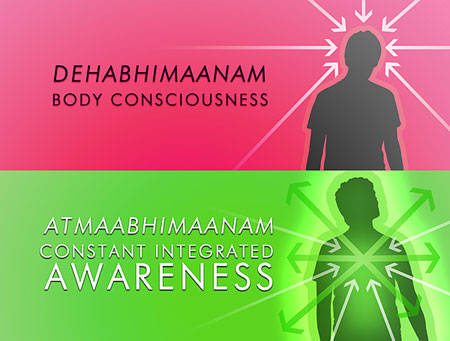 |
Thus, starting in this simple manner, we can become increasingly Swami-conscious, seeing Him and associating Him with every little thing that happens to us.
If we are determined to see Him all the time, we achieve what Swami refers to as Constant Integrated Awareness. In simple terms, this is how we can move away from Dehaabhimaanam towards Atmaabhimaanam.
Believe me, when we attempt this transformation, Swami responds generously, quietly making His support and Presence evident all the time.
God Responds in Many Sweet Ways
I am not joking; I have actually tried this and found it to be quite effective. I assure you that there are definite fallouts and benefits. Firstly, one learns to smile more often. Next, our smile begets a smile and we find that people tend to be more friendly and positive to us. This quietly but most definitely, reduces the number of friction points; otherwise, there are any number of occurrences in these days of high tension, that could trigger us and cause us to flare up.
More than anything, I soon found that often when I was stuck in a task and did not know how to proceed, someone would come from somewhere with some kind of help that enabled me to overcome the problem. I honestly tell you that this sort of thing happens all the time in our Studio, not only to me but indeed to all the boys. But for this mysterious assistance that regularly shows up literally from nowhere, we would not be able to do one tenth of what we now are able to offer you by way of service.
In short, moving over from a state in which we are totally gripped by body-consciousness to one where we feel one with others, at least to some extent, is possible. This transition is accomplished by trying to see the other person as Swami in disguise. At the start, this might sound like a make-believe game and pretty childish, but when this becomes a habit, your perspective does change, and slowly, a very positive personality change does occur. Thus far, I have been focussing mainly on explaining what exactly the word transformation means, and a broad approach for achieving this transformation; basically, it calls for a change of perspective, shifting attention from one’s own ego to the Omnipresent Divinity.
The Path of Self Transformation
We should ask: “Is this a good thing to do? Is it a proper way of spending time or would it be a waste? Will what I am doing benefit others in any way at all and bring some joy at least to them? Finally, would Swami approve of what I am doing and be pleased with it?” |
Let me now turn to the next part of the question, which is whether there are any stages in such a transformation process. I personally believe there are, and according to me, the commonsense approach would be first to try and get rid of the negativity within, replacing it with positivism. According to me, that would be the very first stage. Let me explain.
Let us say there is a person who is prone to get angry rather quickly; this person, let us suppose, is also obese and further, quite lazy – all three are clearly undesirable. In my opinion, the very first thing the person ought to try is to get rid of the tendency to get angry for anything and everything. This would help greatly in calming the Mind; the Mind is very important for the body and unless the Mind becomes calm, it would not be amenable to discipline.
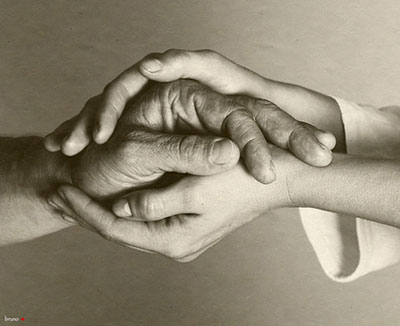 |
|
There is no better way to grow than to Serve selflessly |
OK, we assume the Mind has been calmed to some extent; what next? Well, the person must immediately follow up with some control over eating and take seriously to exercise; this clearly would lead to reduction in weight. By this time, the Mind is not only under reasonable control, but through discipline the body too has been brought around to some extent at least towards normal. In turn, this would help get rid of laziness also. All this is part of what I would call Stage A, where negative aspects are brought under control and progressively diminished.
Simultaneously, the positive aspects must also be seeded and nurtured as carefully as possible. What do I mean by that? Simple; first, one takes to Namasmaranam or chanting the Name very seriously. No matter what particular path of Spiritual development one adopts, I believe that Namasmaranam is a MUST. It is like breathing; can we ever stop breathing? I hope you recall how much stress Swami lays on chanting the Name.
What else apart from Namasmaranam? There are many simple things one could and should start on. One could move around with a genuine smile on one’s face, not for advertising oneself, but to fill people with some confidence that you are a good and peaceful person. That smile is a signal in itself, and people might approach you with requests for help or assistance; in other words helping and not hurting, is a positive activity and attitude.
Reading the lives of great men and women from Gandhi to Mother Teresa and absorbing their experiences would also be another example of positive activity. In short, positive activity is all about using time in a manner that is pleasing to God. As Swami says, “Time waste is life waste.” |
Using one’s time fruitfully to do good rather than on totally unproductive things would be another positive activity. Reading the scriptures intensely, not for creating a record in page-turning but for absorbing the good advice, would be an extremely useful activity. For example, the Bible has so many wonderful parables; if one reads them over and over again, one would get a deeper understanding of the Message of Christ. Similarly, if one reads the Ramayana carefully, one’s understanding of how best to adhere to Sathya and Dharma would get consolidated.
Reading the lives of great men and women from Gandhi to Mother Teresa and absorbing their experiences would also be another example of positive activity. In short, positive activity is all about using time in a manner that is pleasing to God. As Swami says, “Time waste is life waste.” Conversely, time spent on improving one’s positive aspects is life put to proper use.
In summary, transformation is all about making our lives God-centred, which calls for a shift in focus from the external world to the Indweller. Shift in focus means that every time we do something, we should ask: “Is this a good thing to do? Is it a proper way of spending time or would it be a waste? Will what I am doing benefit others in any way at all and bring some joy at least to them? Finally, would Swami approve of what I am doing and be pleased with it?” Transformation is all about ensuring that the answer to all such questions is a resounding YES!
The Benefit of a Personal Audit
 |
|
There are two small “tails” to all this, the first of which is: “How do we know we are making progress?” I personally believe the best way of assessing progress is to conduct, at the end of every day, an honest personal audit.
Before we go to sleep, we should sit on the bed and carefully reflect on all that was done during the day, and then separate all actions into two major categories, negative and positive. Maybe, we could then give a rating to each activity, whether positive or negative, a rating on a scale of one to ten. Total up and see what the score board looks like. After that, one must plan the corrective steps that are required.
All this is the analytical way of doing things, that so-called experts like to explain with charts, graphs, equations and so on. I tell you, there is a much simpler method. Start the day with God, spend the day with God, fill the day with God and end the day with God. If you do that, no need for all this audit business; things would take care of themselves!
Want to know how to be God-conscious non-stop? Well, tune in to Radio Sai! We are on 24/7, and with the internet, we can be reached anywhere in the world, even in Antarctica! Not so difficult, is it?
I think I have said enough and shall stop here for today. Thanks for spending your valuable time to read this. Jai Sai Ram.
Dear Reader, how do you like this series? Does it help you in any way? Do you have any spiritual questions which need clarification? Please feel free to write to us at h2h@radiosai.org mentioning your name and country. Thank you for your time.






